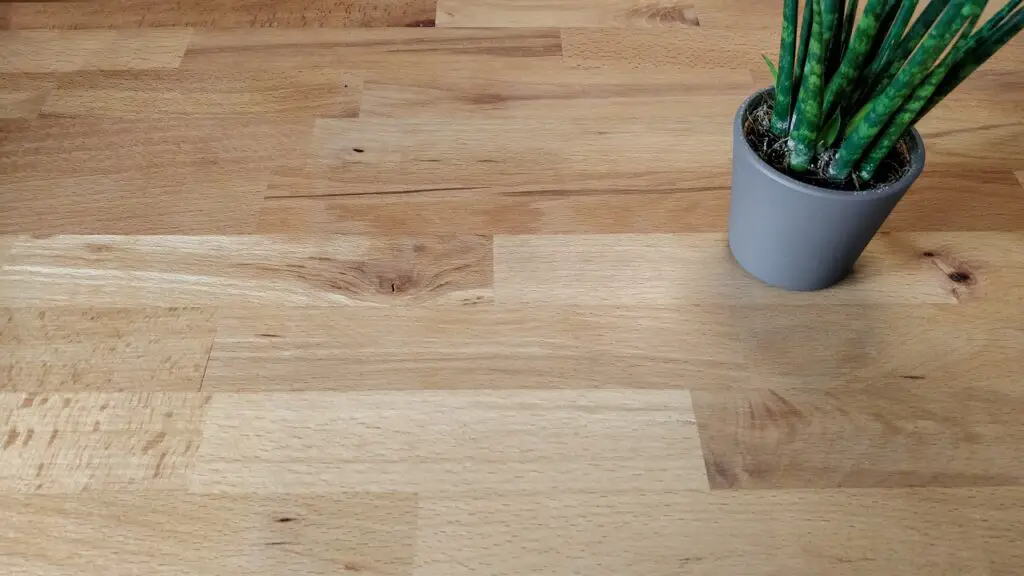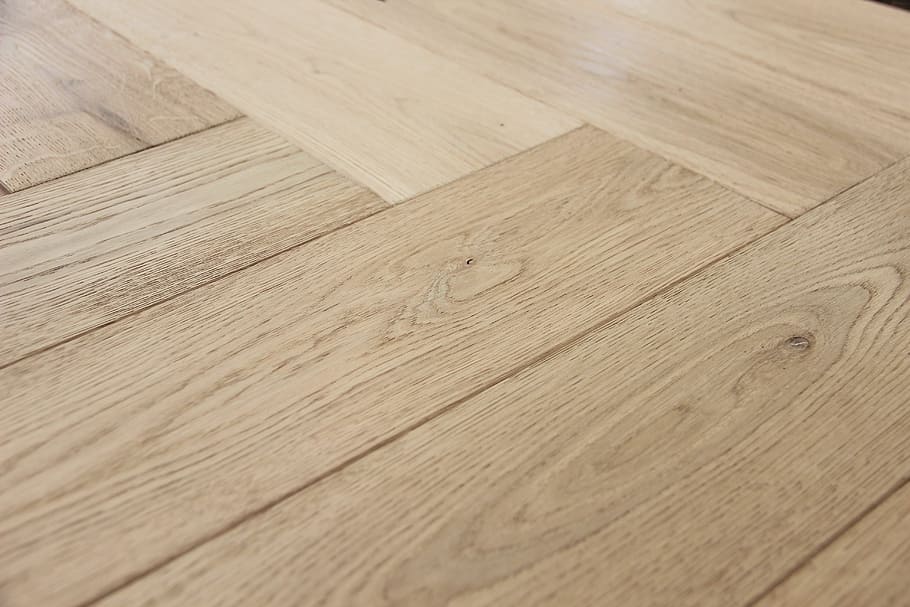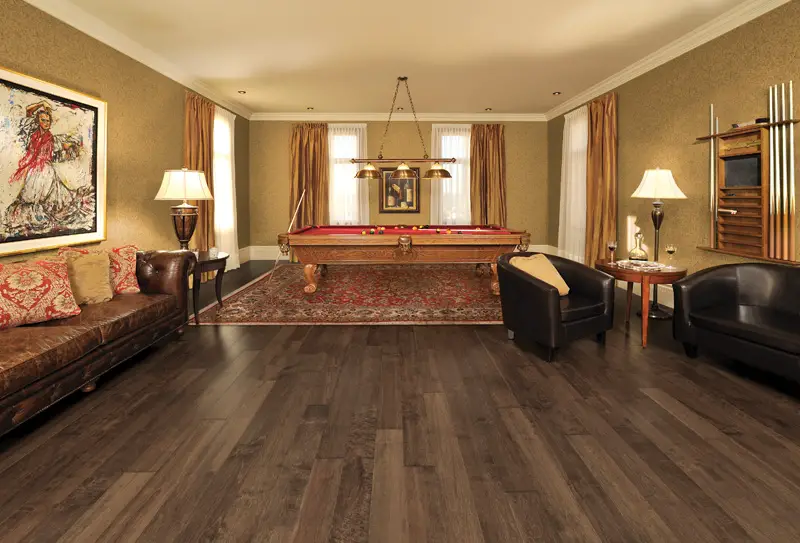As homeowners, we understand the importance of finding the right flooring for our homes. With so many different options to choose from, it can be difficult to decide which one is best suited to your needs and budget.
One popular debate amongst homeowners is whether engineered hardwood or luxury vinyl plank (LVP) is better flooring material.
In this article, we’ll be comparing both types of floors and exploring their pros and cons in order to help you make an informed decision about which type of flooring is the right choice for you.
What is Engineered Hardwood?

Engineered hardwood is a type of wood flooring that is composed of layers of real wood, such as oak, maple, or cherry. It is then bonded together in layers to form a single piece that is more stable than solid hardwood and better able to endure changes in humidity and temperature.
As the name suggests, engineered hardwood floors are designed for long-term durability and are available in a variety of colors and styles to match any interior decor.
Pros of Engineered Hardwood
One major benefit of choosing engineered hardwood over traditional hardwood is its stability; since it’s made up of multiple layers, it won’t warp due to changes in humidity like solid hardwood can.
Additionally, engineered hardwood floors are easier to install and more affordable than solid hardwood floors.
The materials used in engineered hardwood also make it one of the most environmentally friendly flooring options available, since it uses less timber and can be re-sanded multiple times instead of ending up in a landfill.
Cons
While engineered hardwood does have many benefits, there are some drawbacks to consider. One of the biggest cons is that it can’t be refinished as many times as solid hardwood floors can; after 3-4 sandings, the wood will begin to wear down and lose its luster.
Additionally, although engineered hardwood is less likely to warp than traditional wood flooring, it still has the potential to expand or shrink in extreme changes in humidity.
Installation:
Engineered hardwood is relatively easy to install since it can be purchased as a pre-finished product that requires no sanding or staining. However, there are some things to keep in mind when installing engineered hardwood floors.
It’s important to ensure that the subfloor is completely flat and level before starting installation; otherwise, the floor may end up uneven.
Additionally, it’s essential to leave enough space for expansion between the planks so they don’t buckle when exposed to changes in humidity and temperature.
Tools Required:
Installing engineered hardwood floors requires some special tools and materials. A circular saw, a jigsaw, and an air compressor are needed to cut the planks to size before installation.
Other materials required include glue or screws, a rubber mallet, a trowel, and flooring spacers.
Steps:
1. Measure the room to determine how much flooring you will need and purchase accordingly.
2. Prepare the subfloor by ensuring it is completely level and flat, as well as free of debris such as dust and dirt.
3. Install a moisture barrier if necessary; this can help protect the planks from warping due to changes in humidity.
4. Place spacers between each plank for expansion purposes, then begin installing the planks of engineered hardwood in rows going in the same direction throughout the room.
5. Once all of the planks have been installed, use a mallet or tapping block to ensure that they are securely fastened together and there are no gaps or loose spots between them.
6. Finish up by trimming the planks to fit along the edges of walls, door jambs, and other obstacles in the room.
7. Apply a coat of finish to the floor once all the planks have been installed.
Safety Tips:
1. Wear protective gloves and safety glasses when cutting and installing the engineered hardwood planks to avoid injury from sharp objects.
2. Keep a damp cloth handy to wipe off any sawdust or debris that accumulates during installation.
3. Make sure your work area is well-ventilated, as some of the finishes used on engineered hardwood planks can emit hazardous fumes.
4. If you’re working with a moisture barrier, install it according to the manufacturer’s instructions for maximum protection against water damage and warping.
What is Luxury Vinyl Plank?

Luxury vinyl plank (LVP) is a type of resilient flooring made up of several layers, including a backing layer, an image layer, and a wear layer. It’s waterproof, making it ideal for areas prone to moisture such as bathrooms or kitchens.
LVP comes in both wood-look and stone-look varieties, offering homeowners plenty of design choices that can suit any interior décor.
Pros of Luxury Vinyl Plank
One of the main benefits of the luxury vinyl plank is its affordability compared to traditional hardwood flooring. Additionally, it’s incredibly durable and can stand up to heavy foot traffic and everyday wear and tear.
LVP also provides superior acoustic insulation, making it a great choice for families with young children or those who live in multi-story homes.
Finally, since luxury vinyl plank is 100% waterproof, you don’t have to worry about moisture damage like you would with engineered hardwood floors.
Cons
The downside of the luxury vinyl plank is that it can’t be refinished like engineered hardwood. This means that if the wear layer becomes scratched or worn over time, the only way to fix it is to replace the entire floor.
Additionally, LVP isn’t as durable as some other types of resilient flooring such as ceramic tile or stone.
Finally, while luxury vinyl plank is a great choice for areas prone to moisture, it’s not recommended for outdoor installation due to its susceptibility to UV rays and extreme temperatures.
Installation Process:
Tools required:
- Utility knife
- Tape measure
- Pencil
- Jigsaw
- Hammer
- Chalk line
- Paint roller (for glue-down installations)
Steps:
1. Start by preparing your subfloor for installation by cleaning it and making sure there are no cracks or uneven spots on the surface.
2. Measure the room and mark off where the LVP will be installed to ensure accurate placement.
3. Cut the planks with a saw or utility knife, taking care to follow the manufacturer’s instructions for any special cuts.
4. Place your first piece of LVP in one corner of the room and begin snapping it together using a tapping block and rubber mallet (or hands) as you work your way across the floor.
5. Once all pieces have been placed, use a roller to make sure all seams are properly adhered and secure.
6. Apply grout around each plank as needed to achieve seamless edges between sections of flooring, then allow everything to dry before applying your finish.
Safety Tips:
1. Wear safety goggles and gloves when cutting LVP to protect your eyes and hands from debris or sharp edges.
2. Make sure the area is well-ventilated by opening windows or using a fan during installation, as some adhesives may contain fumes that can cause dizziness or nausea if inhaled in large quantities.
3. Do not attempt to install LVP over an existing flooring or uneven surface.
4. Follow all manufacturer instructions for installation and care.
Which Is Right For You?
When it comes time to choose between an engineered hardwood floor or luxury vinyl plank, there are a few things to consider. While both types of floors provide attractive and waterproof surfaces, there are some distinct differences between the two.
Durability:
When it comes to durability, LVP may be the better choice. This type of flooring is incredibly resilient and can stand up to heavy foot traffic and everyday wear and tear with ease. It also provides superior acoustic insulation for busy households or multi-story homes.
On the other hand, engineered hardwood floors may not be as durable if they aren’t well maintained over time.
Style:
If you’re looking for a more luxurious look in your home, engineered hardwood may be the better option. Luxury vinyl plank offers realistic wood-look and stone-look varieties, but engineered hardwood provides a more natural look.
Additionally, it’s available in a wide range of colors and styles to suit any interior decor.
Maintenance:
When it comes to maintenance, luxury vinyl plank is the clear winner. This type of flooring requires minimal care and can be quickly wiped down with a damp mop or cloth.
However, engineered hardwood floors require more maintenance and must be regularly cleaned and sealed to maintain their appearance over time.
Installation:
Luxury vinyl plank is much easier to install than engineered hardwood. It can be installed directly over most existing floors, and it’s available in a variety of click-together planks that make installation simple.
Engineered hardwood must be carefully installed by an experienced professional, which can lead to additional costs.
Resale Value:
While Luxury Vinyl Plank may be more affordable initially, it won’t provide as much of a return on your investment if you plan to sell your home in the future. The classic look of engineered hardwood can increase the value of your home and make it more appealing to potential buyers.
Cost:
Lastly, when considering cost, Luxury Vinyl Plank is typically more affordable than an engineered hardwood floor. It also has the added benefit of being waterproof, so you won’t have to worry about water damage.
Related Topics:
Conclusion
Both engineered hardwood and luxury vinyl plank provide excellent waterproof surfaces for your home, but each has its own unique advantages. Durability, style, maintenance, and cost should all be taken into consideration when choosing between the two.
Ultimately, the right choice depends on your personal preferences as well as budgetary requirements. Knowing what to expect from each type of flooring can help you make an informed decision that best suits your needs.
FAQs
What is the difference between engineered hardwood and luxury vinyl plank?
Engineered hardwood is a type of flooring that consists of several layers of wood bonded together, while Luxury Vinyl Plank (LVP) is made from PVC plastic for a waterproof and durable surface.
Is engineered hardwood waterproof?
No, engineered hardwood is not waterproof, although it can be sealed to make it more resistant to moisture.
What are the advantages of luxury vinyl plank over engineered hardwood?
Luxury Vinyl Plank (LVP) offers superior durability compared to engineered hardwood due to its waterproof construction. It’s also easier to maintain and typically more affordable than an engineered hardwood floor.
Is luxury vinyl plank more expensive than engineered hardwood?
No, Luxury Vinyl Plank is generally more affordable than engineered hardwood flooring. It also has the added benefit of being waterproof, so you won’t have to worry about water damage.

